In Scampia, one of the most challenged suburbs of Naples, a popular initiative uses women’s emancipation, art and culture, pedagogy, good food and social capital as main ingredients for a recipe for cultural development and social recovery.The fusion of experiences between two closely related entities, the gastronomic social enterprise La Kumpanìa and the association for social advancement Chi rom e… chi no (in Neapolitan “who sleeps and who doesn’t”, but also “who is Roma and who isn’t”) gave life to Chikù, the first Italian-Romani restaurant in the country… and much more than that.
We spoke about this unusual project with Emma Ferulano, co-founder of Chi rom e … chi no and president of La Kumpanìa.
You have been present in the neighbourhood for twenty years now. How did you start, and under what conditions did you operate?
When we founded Chi rom e… chi no in 2002, the neighbourhood was in full feud, with very high unemployment rates, crime and a severe shortage of cultural services. We decided to act starting from the most disadvantaged corner of Scampia, the unauthorised Roma camp in Cupa Perillo street. Being unauthorised, its inhabitants paradoxically had the opportunity to organise themselves in a more autonomous way, which certainly favoured our experimental approach of libertarian, Montessori-inspired pedagogy.
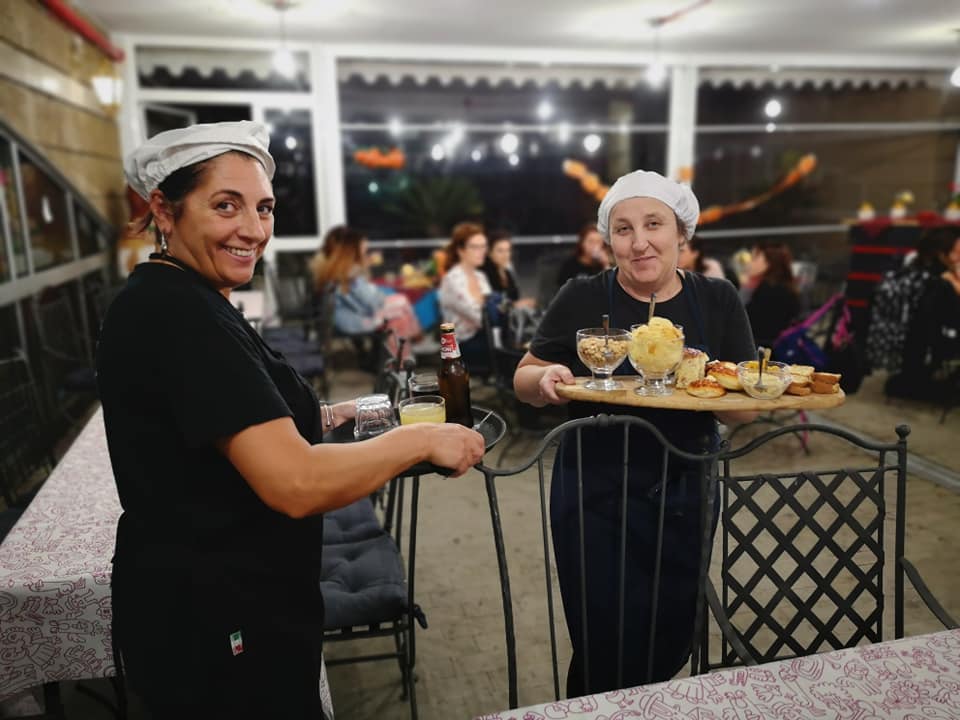
We built a shack, Scola Jungla, with the inhabitants of the camp, with great effort but just as much motivation. Through pedagogical, intercultural and social interventions we have managed to involve the entire community, in which some of its inhabitants have lived since the 1970s. Despite the precariousness, self-organisation worked very well. Life in a camp is very tiring, but our activities have allowed us to make ourselves known to the community, making this a meeting point between Roma and non-Roma people. Scola Jungla had in fact become a cultural public space within an isolated and peripheral neighbourhood, in one of the most marginal spaces of all, a Roma camp, and at the same time it has become a space of struggle for the right to a dignified life.
But we weren’t the only ones doing something in the area: as soon as we arrived, the first thing we organised was the social carnival together with the Gridas, a historic social centre and cultural association of Scampia. This carnival, now in its fortieth edition, has become a cultural reference point of the city and constituted the first attempt to create a cultural and political tradition within the “no-history” district of Scampia, where – starting from the 1970s – new communities had arrived in waves, including Roma and earthquake victims. The Jesuits are also present in the neighbourhood with a strong focus on education, training and work. Then there’s the Mammut territorial centre, with which we created the Public Space Committee, Banda Baleno (the first Neapolitan murga), Dream Team Donne in Rete, Legambiente and its tireless redevelopment of public green areas, to name a few. Thanks to all these organisations and their activities, over time a fertile ground has been created to act experimentally in a very isolated neighbourhood, and one of the strongest networks of associations in Italy has been consolidated.
What activities did Scola Jungla accommodate, and what happened later to the shack?
Inside Scola Jungla we organised neighbourhood assemblies, the carnival and manual workshops, after-school activities and gave legal advice. But first of all, Scola Jungla was a meeting place in which to exchange experiences and practices to rebel against institutional abandonment and decay while regaining possession of the public space. To give an example of how much Scola Jungla has also influenced the appearance of the neighbourhood, we soon organised creative walks, and inspired by Felice Pignataro’s new tradition of participatory murals we created a series around the area. New murals were painted in lot P, the social housing district that borders the Roma camp and with which we have always worked, in the infamous Sails of Scampia, all made with the participation of inhabitants from all age ranges.
Since 2014, the shack is no longer there: all its activities have moved and have grown into Chikù, an alternative restaurant and meeting place in the heart of Scampia.
How would you describe Chikù?
Chikù is the fusion of two souls, Chi rom e… chi no and La Kumpanìa, the first social enterprise in Italy to bring together Roma and Italian women since 2013. It is in fact the first Italian-Romani restaurant in the country, but for us it is much more than that: it is the place where we were able to meet requests, passions and activities. It is the headquarters of all of us, and one of the few meeting points in the neighbourhood.
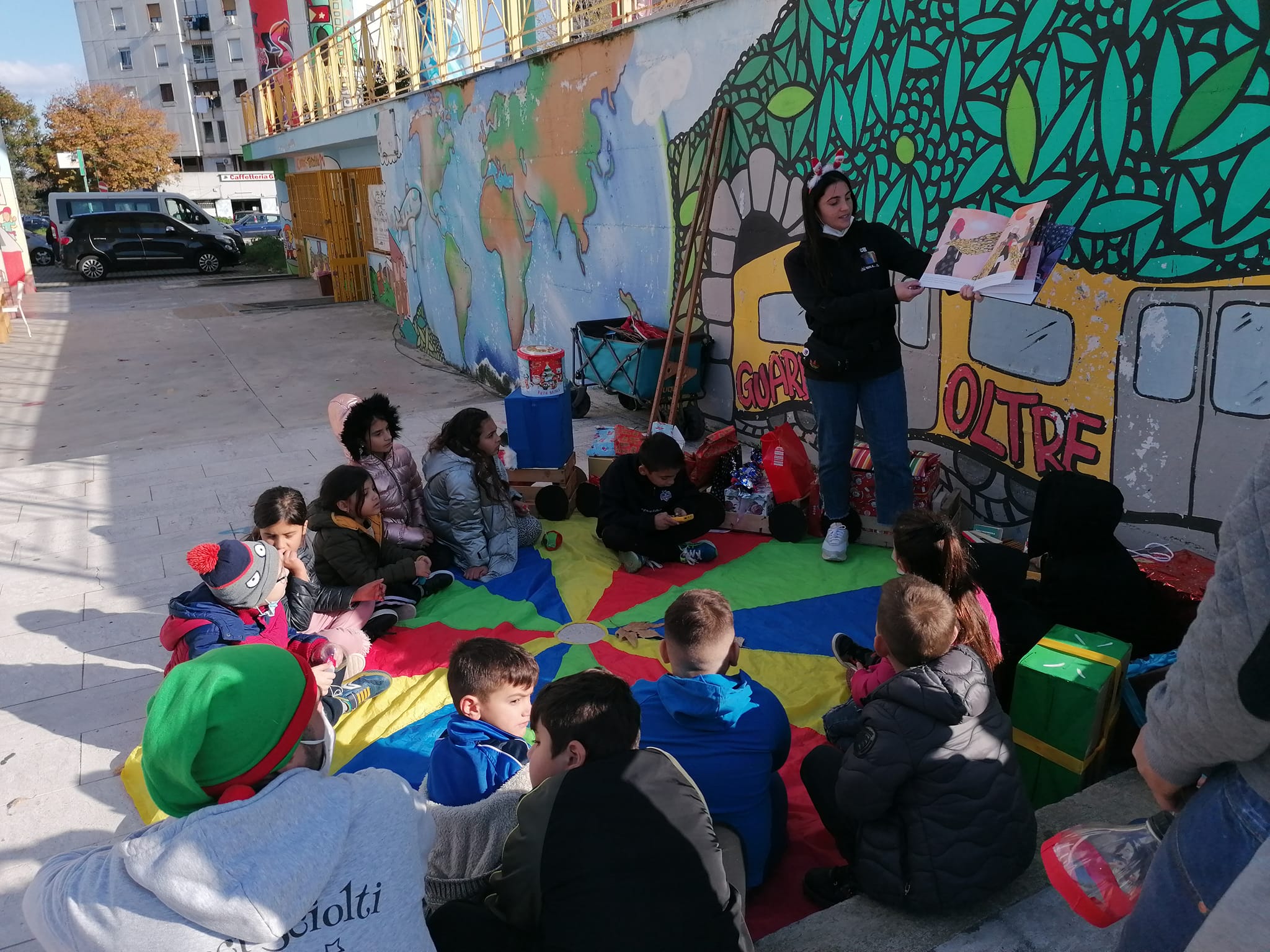
How did you start cooking?
Since the times of Scola Jungla, we always ate together between workshops and assemblies, relaxing and discussing the progress of our projects. It all happened in a very natural way, as the bond with the mothers of the children who took part in our courses was very strong, and when the women of the camp started cooking for the meetings we understood their potential. The awareness of belonging to a discriminated minority has always pushed them to cook their best dishes, presenting them in the best possible way. Italians are usually frightened when entering a Roma camp. But in front of an excellent dinner, prejudice begins to break down, and people get closer to one another more easily. Hence the idea of using food as a tool for social and professional recovery.
We also think that having children does not have to be the primary purpose in a woman’s life, nor does it have to become a reason for self-isolation. Having equal opportunities at the core of our work, we also managed to create awareness in the field of gender issues.
When we started our catering service connecting traditions from Italy and the Balkans, we realised that cooking was not just a passion, it was also a new possibility, as well as a challenge. With our catering service we have already toured all over Italy – from the Biennale of Venice to the Slow Food fair in Turin, including Rome and the Presidency of the Council of Ministers for a commission from UNAR – National Office against Racial Discrimination.
How did you set up Chikù, and what activities does it offer?
We took this space on loan for use for six years in 2013 through the participation in a municipal tender. After renovating the place at our expenses, we took office and inaugurated the venue in November 2014. Chikù lies inside a multifunctional centre: we share the building with an employment centre, offices, the local Police, and an auditorium. Many of the spaces are completely unused, including the auditorium, so much so that our restaurant is located in what was originally the auditorium’s lounge and bar.
We have a large area at our disposal, with outdoor and indoor spaces that have allowed us to lay the foundations for a progressive growth. Chikù is not just a restaurant: we are also a catering service, we prepare snacks for schools, we organise cooking classes and gastronomic-cultural events. La Kumpanìa has therefore managed to combine healthy and sustainable, seasonal and plastic-free gastronomy with the possibility of giving work and agency to women from disadvantaged backgrounds. In turn, Chi rom e… chi no has expanded its activities, which now range from laboratories for young people and adults in the “Econido”, a kindergarten aimed at children from 0 to 6 years, passing through the courses in theatre and pedagogy with the Arrevuoto association. We also keep up the work of social inquiry, counter-information, the self-production of audio-visual and literary materials and project planning.
How did you manage to finance yourself?
The first call we participated in was UNAR’s “Positive Actions” in 2009. The call was aimed at foreign women, and we didn’t like this concept because in our context it would have created positive discrimination within Scampia, where the rate of unemployment was – and still is – very high, where there are serious drug and crime issues. We therefore proposed to broaden the range of action and intertwine the target groups.
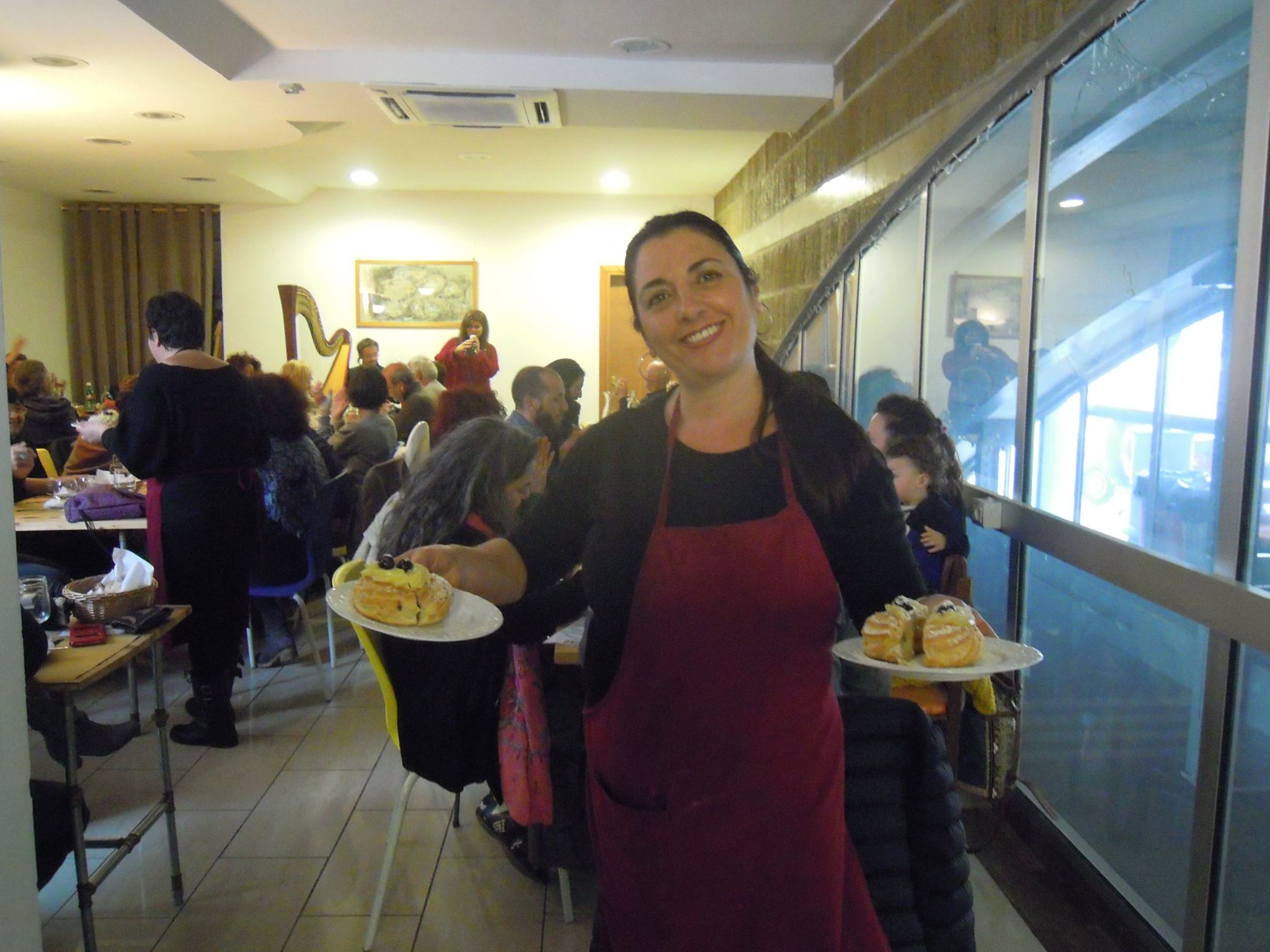
We won €38,000 for one year. The grant was insufficient for all our plans , so we used the restaurants in the area, the parish and any other possibilities to be able to cook, as we initially did not have materials. There was no human resource payment either, so we assumed that this project would fail: it was not ethically correct to create a project to support a very poor minority without paying the people who would work there. We, from the founding group, had in fact decided to work for a year without pay in order to be able to pay the participants, about twenty at that time.
Slowly but steadily, since 2010 we have begun to win small prizes, and this has allowed us to buy the first equipment and the first minivan. Subsequently, with the Unicredit Foundation and the Fondazione con il Sud, in 2012 we received €144,000 over three years. Once again, it was an insufficient amount, but it allowed us to come here (in 2013) and buy the kitchen.
At the beginning there was no lack of criticism from the foundations: they told us that we are too focused on the social aspects, when social heritage is the very meaning and the lifeblood of our project. The most attractive projects are usually linked to more commercial potentials and are already included in more successfully planned and maintained areas than ours, so they represent less risk. Basically, money calls for money, leaving other areas and other projects in the shadows. We, on the other hand, say that it would take many more projects like Chikù, because this is how social discomfort is overcome, jobs are created and people are removed from poverty and crime.
How are the two organisations around Chikù managed and governed?
Chi rom e… chi no was born as an informal group from the union of people motivated by a common vision. We became an association for social advancement in 2006 to formalise the situation and to gain access to calls for tenders that we increasingly needed. La Kumpanìa, on the other hand, was born in 2010 as a project by Chi rom e… chi no, and then became a separate social enterprise in 2013.
From the point of view of formal roles, I am president of La Kumpanìa. Barbara Pierro, a lawyer, is president of Chi Rom e… chi no while Biagio Di Bennardo is adviser and vice president of Chi Rom e… chi no. The three of us are the core of management, planning and general coordination of Chikù’s activities, in which the two organisations converge. Roma and Italian women are part of La Kumpanìa and take care of the gastronomic activities: Slavica Aleksic, Rosaria Fele, Emilia Gemito, Rosa Manfra, Samantha Vukovinovic, and others during all these years. A pedagogical team takes care of educational activities and workshops: Giovanna Mauriello, Assunta Mascolo, and others. In all, we are about 12 people. Considering the multiple activities of Chikù and the fast pace of the kitchen and project design, someone is always needed to guide the work, but from a practical point of view we are horizontal and we favour participation processes: we do many assemblies, dividing the tasks and collectively deciding on important issues.
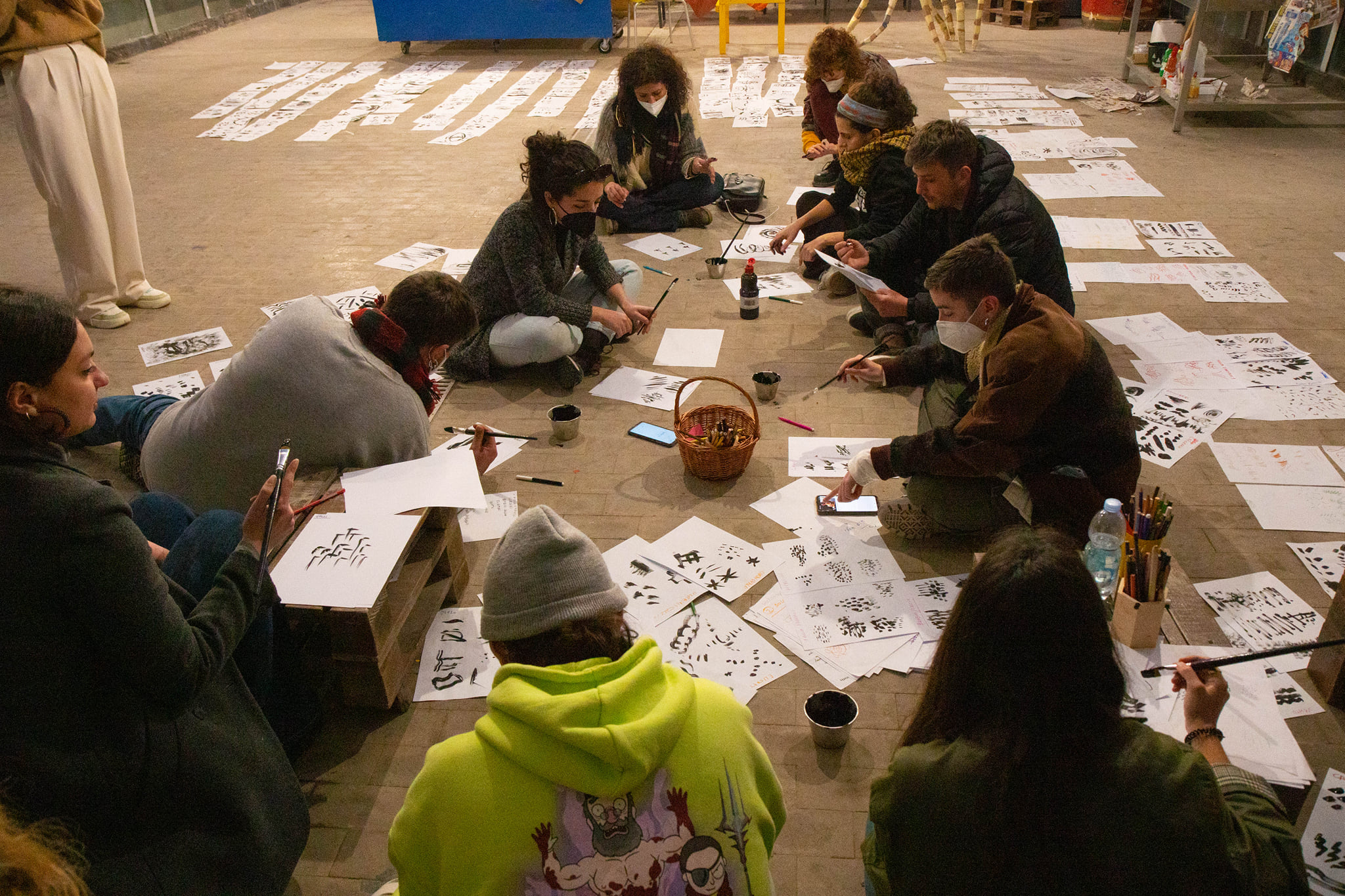
From an economic point of view, we decided right from the start, setting it in the statute of La Kumpanìa, that profits are not shared between the members but reinvested in the social and pedagogical projects that are carried out by Chikù in Scampia. During the first years of catering, for example, we made a cash fund and we did not earn anything, even though we stayed within budget. When we started to work harder and finally started to earn something, we made all salaries practically identical, we formalised permanent employment contracts and we always gave priority to the work group in times of crisis.
Who are your target groups?
Our courses, services and workshops are open to everyone. There is a large number of Roma users also with regard to legal assistance issues, and a large participation of Roma people from all over Naples and the province regarding the housing issue. We have in fact created the Abitare Cupa Perillo committee which gathers Roma and non-Roma around the problem of Roma housing, to try and intersect the communities.
We have never liked the idea of creating other Roma ghettos, not even by “positive discrimination” – we have always fought for overcoming the problem of Roma camps. Therefore, we try to create relationships and encourage the participation of everyone. Our services are addressed to all the inhabitants of Scampia and the broader area, including Roma, Italians and foreigners alike.
Do you still experience negative bias towards your activities?
Prejudice is still strong. I myself have friends who have never even come to see the place because they are afraid of the neighbourhood in which it is located. From a strictly professional and qualitative point of view, one of the most difficult things for us was to establish ourselves as a place with good food, not only different, but supportive and sustainable. Especially at the beginning, people asked us “Why do you do it?”. We have always replied “Otherwise who would do it?” and then, “Why not?”. The results are evident – more and more people are overcoming prejudice and discovering our cuisine. Outside the neighbourhood and the city, many political figures were stunned to see that there are women from fragile and vulnerable backgrounds who have learned a trade, who are aware of the problems in which they live, who are moderately educated but decided to speak up.
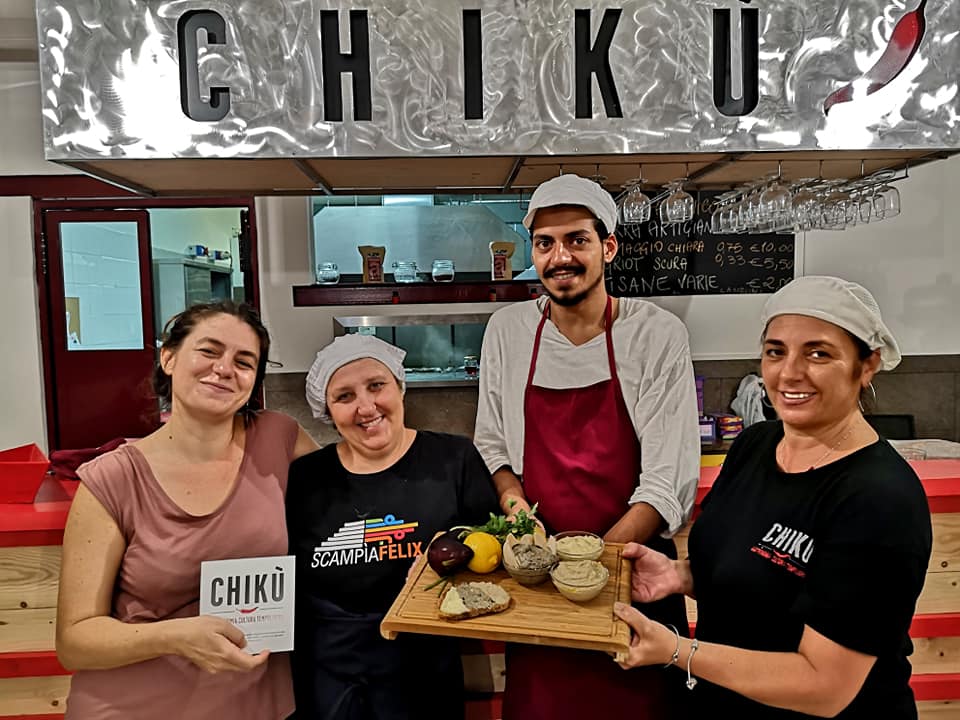
What are your relations with the Municipality?
We must speak clearly: politics, as far as the Roma issue is concerned, has been truly disappointing. We have had decades-long relations with the Municipality regarding the Roma issue and they have never been easy because we fight against the existence of the camps and for decent housing for all.
We publish articles and denounce the issue at the city and provincial level, so we act politically even beyond Scampia. Amnesty International and other observers come to us to find out about the effects of institutional discrimination on the Roma community. We represent a challenge against the establishment and the inactivity of the institutions. The bad management of municipal properties, for example of the half-abandoned complex in which we find ourselves, is for us the symbol of waste, and we have always spoken up: there is therefore great awe towards us precisely because we resist and reveal inefficiencies. The political class does not experience everyday reality, and there is also strong ignorance due to the fact that no one wants to get their hands dirty. Although they are interested in our case, and despite recognising the usefulness of our work, they do not provide effective tools that could grant us guarantees for the future. Politics need great acts. We must then see if these interventions are made to last or only to bring consensus.
Currently, the Roma communities of Scampia, who had lived here for about thirty years, have been decimated by fires and forced transfers, and the economic, housing and overall precariousness has been exacerbated even more by the isolation caused by the Covid lockdowns. The younger generations of Roma lack a vision for their future, probably worse than that of their elder brothers and parents.
How has Covid-19 affected your activities? Did it have an impact on your lease contract with the municipality?
In order to ensure that the space remained open, we conducted a long negotiation with the municipality, and in the end we entered into a lease agreement with an overall sustainable monthly rent. The lockdown has severely tested La Kumpanía, which in fact has been at a standstill without working for practically two years; Chikù had to close the doors of its kitchen for a long time, while the educational activities never stopped. We have set up the BAM, the Mutual Support Brigade with the neighbourhood network, to support the hundreds of Roma and Italian people who have been reduced to extreme poverty by the lockdown, without being able to access any support measure from the State. We provided food and legal, educational, medical, psychological assistance thanks to a large voluntary effort.
Fortunately, for our work group, the permanent contracts guaranteed at least severance pay – that’s at least something. The group has not disintegrated but rather has rediscovered its opportunities and experimented with new ways and synergies to stay together. We were ready to relaunch Chikù towards the utopia of united communities, attempting to follow a path to re-appropriate and revitalise spaces and liberate them and ourselves from social and economic oppression.
What are the next steps in your organisation, the current projects you are currently working on?
Our most important current project is SPEECH Spicc funded by the PON Metro programme which laid the foundations for the construction of a widespread urban Ecomuseum. This Ecomuseum consists of a set of virtual and physical spaces that strengthen the inhabitants’ sense of community, contributing to a new image of the neighbourhood. Chi Rom e… chi no is also the leader of Ip Ip Urrà, a three-year national project funded by Fondazione con il Sud and selected by Percorsi Con i Bambini as part of the Fund for combating juvenile educational poverty. Another regional project funded by the Social Enterprise Con i Bambini is called Cambio rotta (Change course) for the fight against juvenile deviance, led by Chi rom e… chi no.

